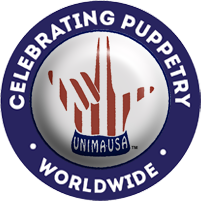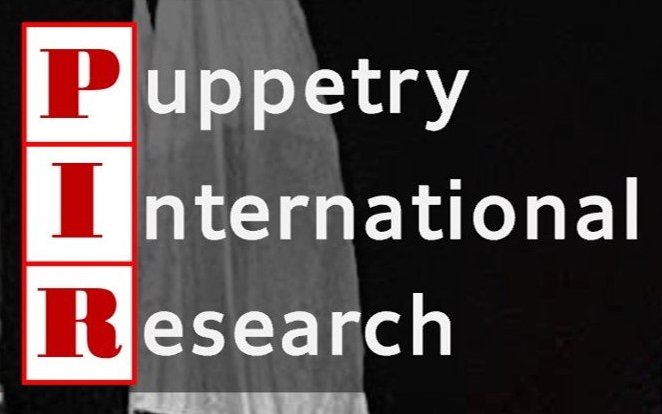THE PUPPET CENTER
FALL/WINTER 2014 ISSUE NO. 36
Table of Contents • Editor's Note • Selections
Handspring Trust: A Center with a Mission
by Jane Taylor
photography by Robyn-Leigh Swart
Handspring Theatre Company, the South African theater makers (now most celebrated for War Horse, but also for such shows as Woyzeck on the Highveld, Faustus in Africa and Ubu and the Truth Commission) has for the past four decades engaged in an aesthetic exploration of relationship: the relations between subjects, as well as the relations between Subjects and Objects. And in fact, they persisted in thinking about the enigmatic mutuality of these entanglements. This sustained and serious enquiry was ongoing during the years of Apartheid and then through that regime's demise. All this while, they were involved in an embodied and a material arts practice that provoked their own thinking about definitions with relation to questions of agency and autonomy. Who is for whom? What is for whom? Who is for what? The enquiries provoked ideas of Self and Other, and raised volatile questions about race, about gender, about animals, about persons, about things.
The puppet is a companion of extraordinary gifts. It will be as volatile, as docile, as effusive, or as silent as we need it to be. It can provide a metaphoric self that will supplement our own deficiencies; it can enable us to live inside able bodies if we are broken; it can allow us to perform experiments in order to explore gendered or raced identities. Handspring Puppet Company, through its decades of working meticulously and thoughtfully alongside puppets, has established an Arts Trust with a double set of imperatives.
Handspring Trust seeks to be an advocate for puppetry arts; and Handspring Trust seeks to engage in meaningful arts development for youth in the region of Southern Africa. In particular, Handspring Trust seeks to take advantage of the extraordinary opportunities that have come to Handspring Puppet Company in the past decade through its international work in the arts of puppet performance. Most substantially the massively popular success of the production of War Horse, with the National Theatre in the UK, has enabled Handspring to engage in increasingly meaningful creative development work in Southern Africa.
The Contexts:
1. Barrydale:
Some three hours northeast of Cape Town, South Africa, is the small rural community of Barrydale, in a semi-desert scrubland known locally as the Little Karoo. In the 1960s, at the height of Apartheid engineering in South Africa, all members of the Barrydale community who were not classified as European by South Africa's race laws, were compelled to leave their homes in the village, and were relocated to a crowded settlement a mile or two away, in the foothills of the great mountain shelf overlooking Barrydale. Many of those displaced were descendants of "First Peoples" in the region, the Khoisan or Bushmen, hunter-gatherers historically from the region. Barrydale became a white village. The "new-made" township that became the settlement of the indigenous or so-called "coloured" (or mixed-race) community was officially named "Smitsville," but the people who were displaced there named it, with considerable bitterness, "Steek-my-Weg" ["Hide-Me-Away"].
For the past two decades, since the first non-racial election in South Africa, some citizens of each of the two divided communities, "Smitsville" and "Barrydale" have seriously engaged in the processes of reconciliation and communication. There have been some significant achievements, though there is much to be done. Unemployment is at a devastating rate in the region, and there is widespread and debilitating alcoholism, fetal alcohol syndrome is rife, and child abuse a serious problem.
The Project:
Since 2010 Handspring Trust has been engaged in developing a puppetry- based Festival that takes place in Barrydale on December 16th, the national "Day of Reconciliation" in South Africa. In the weeks preceding the holiday, Handspring Trust supports members of Handspring Puppet Company and allied artists to engage with the school children in the area, in order to expose them to performance, play and puppetry arts. The Festival has grown in complexity and demand from year to year. Increasingly the project deploys a range of partners, including professionals as well as fellowship scholars. In the area, the key partnerships are with "Net-Vir-Pret" ["Just-for-Fun"], an arts education program run by Peter Tokela that makes arts available for children on farm schools and in local villages. Because so many children suffer from the profound effects of fetal alcohol syndrome, there are severe learning disabilities; and Tokela has developed a very successful strategy using traditional drumming to coach young scholars in counting and mathematics skills.
Handspring Trust works with "Net-Vir-Pret," as well as members of "Magpie" – an arts collective who are activists for HIV positive youth – in order to train the local children in performance, and to help develop youngsters through an exploration of self and others using puppetry arts. During the Apartheid era, school children from indigenous communities would have had no access to arts education and so the historical deficit in arts training is substantial. More recently, because Barrydale is increasingly a community for "outsider artists" there is a newly-diverse spectrum of community members engaging in the educational program and the Festival.
Puppets are marvelously volatile and lively participants in the processes of testing and developing young selves. The puppets serve as doubles that can create exploratory identities. As a result, young people who have uncertain or negative self-representations can engage in transformative play with projective identities through enabling puppets. As the Festival has evolved, the participants have begun to make ever-stronger demands. In the past two years, the Festival has been themed in order to raise questions about identity. In 2012, the puppets were a giant peacock and an ostrich who develop an amorous relation, then produce a vast egg that gives birth to a hybrid bird. In 2013, the story revolved around a narrative of a mermaid and an elephant. There is a quality of fable to these works, which draw on traditional story-telling strategies indigenous to the area. Research for the stories has begun to engage with archeological exploration of rock art in the area, as well as local mythologies.
In developing the theatre works, children have had the opportunity to travel to regional arts festivals, to visit theatre in Cape Town, and have also been supported in their ambition to study and develop themselves. The Trust works with local educators to prepare students for the possibility of admission to university. Almost without exception, these students would be the first generation to complete high school. Handspring Trust derives much of its funding from Handspring Puppet Company; though we also have had substantial support from the Blumberg Foundation, a family trust based in Canada. There has also been support from the author of War Horse, Michael Morpurgo; artist/director William Kentridge is the patron of the Handspring Barrydale Festival. The Centre for Humanities Research at the University of the Western Cape has raised funding for administrators and artists involved in the program. The Festival planning for 2014 is well advanced.
2. Masiphumelele:
Handspring Trust also works with a group of talented young adults in Masiphumelele, an urban "informal settlement," or shanty town, on the outskirts of Cape Town, on the Southern Peninsula. Masiphumelele is an over-crowded and volatile context where generous and openhearted beings are compelled through economic necessity to live in unsafe and precarious circumstances alongside shiftless and dangerous individuals, many of whom are themselves destitute and homeless. (Originally known as Site 5, Masiphumelele got its name from the local residents. The word means "we will succeed.") Many members of the township are migrants who have come into Cape Town in search of employment from remote regions in South Africa or from across its borders. As a result, there are periodic outbreaks of xenophobic violence in the area, and many inhabitants from neighboring states who have settled in Masi (as it is known) live with a perpetual anxiety about being persecuted or killed as foreigners.
The Project:
Handspring Trust has established a permanent performance space with re-functioned shipping containers; and has employed a group of puppeteers from Handspring Puppet Company to work with local youngsters to develop an innovative and original work of puppet theatre. The recent piece, about a tortoise that wants to fly, has just won double gold at the Qhawe Festival in the Western Cape. In the process of developing their work, young people are given the opportunity to visit theatres (often for the first time), to work with theatre professionals, and to travel to regional theatre festivals. Members of Handspring assist in the making and design of puppets, and the constructive of play texts.
In 2015 Handspring Trust will, with the University of the Western Cape and the University of Leeds, be running a puppetry conference in Cape Town, "The Emotional Prosthesis." A call for papers will be circulated shortly. The conference fulfills that obligation of the Trust's work to enhance and enrich research into puppetry arts, and to explore the aesthetic and philosophical meanings inherent in non-human performance. Handspring Trust is committed to an exploration, through performance, of the continuities and discontinuities between the object/the animal/ the human. The psychological and metaphysical exploration of "attachment" (from prosthetic limbs, to transplants, to mobile phones, fetishes, dolls, puppets, hearing aids, memories, illness, lovers, parents and pets) will be at the center of our conversations, and we are keen to draw a wide spectrum of ideas into the conversation.
We will be posting details and the call in the coming months.
Handspring Trust encourages engagements and partnerships. The work of the Trust is posted on the Handspring Trust website: http://www.handspringtrust.org.za/
Professor Jane Taylor is the CEO of the Handspring Trust and a playwright. She has received Fellowships from Mellon and Rockefeller, and has been a Visiting Professor at Oxford and at Cambridge. From 2000 to 2009 she was the Skye Chair of Dramatic Arts at the University of the Witwatersrand. She has been Writer-in-Residence at Northwestern University as well as a periodic Visiting Professor at the University of Chicago.




















